What to Look for in a Personal Trainer
- Lauren Stewart

- Sep 22, 2024
- 4 min read
Updated: Nov 6, 2024
The role of personal trainer has evolved over the years - as has the public's perception of what a personal trainer is supposed to be.
We might see many things when we think about the idea of a "personal trainer" - from the stereotypical "Arnold" gym rat trainer to the leotard-clad energy-filled aerobics focused instructor to the boot camp style weight loss drill sergeant TV character to the So-Cal granola and green juice guru trope to the commercial gym guy with a solid colored Polo shirt and large arm muscles.
But we should know better than to simply think of a personal trainer in terms of how they look.
In fact, we should know better than to think of the value of ANY person in the fitness arena - athletes or professionals - in terms of how they look. The 2024 Olympics was a beautiful showcase of the range of athleticism, bodies, styles, and presentations amongst athletes, coaches, and trainers alike.
So...
What qualifies a person to become a personal trainer?
What are the signs of a GREAT trainer?
What does it mean to succeed as a fitness professional in the world of personal trainers?
Here's a non-exhaustive list of what to look for in a personal trainer.
Is the trainer qualified?
Look for the trainer having an up to date certification from a nationally accredited organization such as ACSM (American College of Sports Medicine), NASM (National Academy of Sports Medicine), ACE (American Council on Exercise), or IFTA (International Fitness Trainers Association), and/or a college degree in exercise science, kinesiology, or physical education.
Trainers aligning with these nationally accredited organizations means that they have a high quality education in the field that is subject to peer review, up to date with current research and standards of practice, and evolving with the times. Additionally, trainers with these certifications are required to maintain their certification through continuing education, which means they are constantly learning.
What experience does the trainer have?
How long has the trainer been working in the field? What different experiences has the trainer had to add to their repertoire? Where did they learn all of their practical skills? What types of settings has the trainer worked at in the past? And, how does that information potentially impact what your experience together might be like? Also, are they willing to talk about past experiences?
Do you get along with the trainer?
When you meet with the trainer, do they communicate easily and well? Do you feel comfortable when talking to them, and are they professional and personable? Do they seem genuinely interested in helping you? Are they a good active listener? Can you see yourself meeting with them potentially multiple times a week and enjoying it?
Does the trainer have experience working with other clients like yourself?
This may or may not be important to you, depending on your goals or needs. But in many cases, clients have specific concerns or situations - like osteoporosis, pregnancy, injury history, or are brand new to fitness - that would be a better fit with a trainer who has experience working with other clients who've experienced those conditions before.
Personal trainers should be equipped to train just about anyone who walks in the door, but most trainers will eventually specialize in a certain niche population, so look for that when you read their bio.
Is the trainer able to share testimonials from their clients?
A sign of a great trainer is that they've got testimonials and reviews to share - whether on their website, on Google, on social media, or shared with them directly from clients. Another way this happens is if a client is willing to refer other people to their trainer - friend referrals are the best sign of a great trainer!
Does the trainer ask you questions not directly related to fitness?
A great trainer is someone who is interested in more than just your workout goals. They should be good at not only creating your fitness program, but also learning about your life beyond fitness so they can help you integrate this fitness program into your lifestyle. That's the hard part!
Does the trainer teach you not just exercises, but movements?
Good trainers have a solid exercise library in their toolbox, but great trainers start by first teaching you how to move your body. Learning how to move your body properly for how it is right now, and being able to translate those movements into your daily life, is more important than learning specifically named exercises that might be popular in the fitness industry. By first teaching you how to move your body, your trainer is setting you up to be able to try almost any exercise because you know how to move YOUR body.
Is the trainer insured?
Trainers working independently should be insured, and trainers working for a gym or studio should either be insured independently or insured under the gym or studio. Check with them to make sure they are covered, if you have concerns about this.

Can the trainer accommodate your schedule?
This is a big one - as things will only work out if your schedules align. Sometimes, both parties must be a little flexible to make things work, but ultimately, personal training only works out when the schedule works!
What to Watch Out for in a Personal Trainer

Be wary of trainers who push specific brands/supplements/diets
When it comes to trainers, be mindful about those who are pushing you to subscribe to very specific brands of supplements or diet fads. Trainers should be aiming for full transparency and should have your wellness as their top priority. This leaves you the consumer open to choosing your own products.
Trainers are not doctors and should not make formal diagnoses

While great trainers are well educated about many types of injuries and musculoskeletal issues, remember that trainers are not doctors and are not formally trained to make formal injury diagnoses for their clients. Trainers have clients, not patients. Diagnosis is beyond the legal scope of practice for personal trainers. Your trainer should encourage you to go to a doctor or physical therapist to get a diagnosis for injury if necessary. Once you've gotten a diagnosis and cleared for exercise rehab, your trainer should be able to help you work through that injury.
In Conclusion...
We believe that our trainers at FIT Carrboro meet all of these standards. We hope you feel confident in our ability to provide you with the high quality experience you deserve.
Happy Training!







































Comments